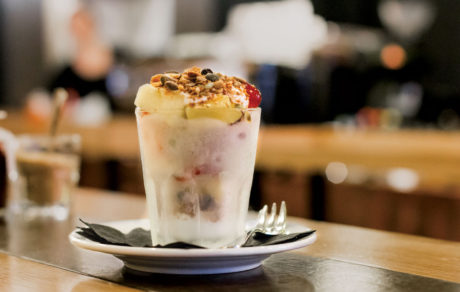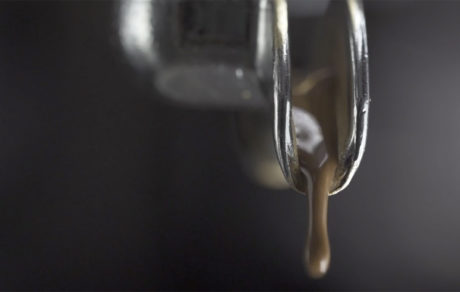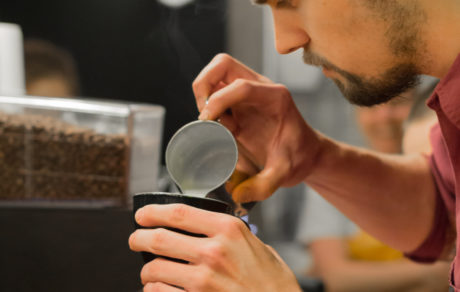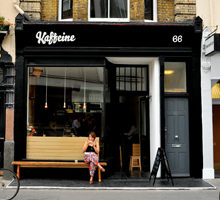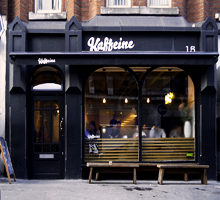London Living Wage Employer - Kaffeine is accredited
When I first worked in London in the mid 90’s, my main job was at a restaurant on Sloane Square, the old Oriel. We were paid £20 per 8 hour shift but we made tips (which were not included in the bill, but were discretionary) from our own sections, which we shared with the bar staff, the expediter and the hostess. The more shifts you worked each week, or the busier sections, the more money you generally made. So I worked six days per week, or double shifts. Work harder, make more, simple. But it had to be done to survive.
When my wife and I came back in 2005, my first jobs while looking for full time employment were through hospitality agencies as a waiter where I was paid the minimum wage of £5.05 per hour. So I worked for three different agencies, which of course meant I did not get the tax free threshold on the second and third employers. That was hard. Travelling all over London to jobs and earning take home about £180 per week. We had so little money in those early days that we used to go to Cafe Nero and buy one coffee to share between us. So I sort of know what it’s like to be in London on minimum wage.
When I was employed as staffing manager at Marylebone Cricket Club, they paid just above the minimum. The pressure was on to pay the least possible, even though the pressure was also on to recruit the best possible skilled staff to work in situations such as the corporate boxes, serving the elite of the cricket, corporate and entertainment worlds.
Having a world class environment helps, as does supportive and encouraging management who care for you. But at the end of the day, the staff member has to live in London, travel from usually zone three or four and have a life. How can you expect staff to work above the minimum, when you only pay them a minimum?
A room to rent is about £120 per week, weekly tube zone 1 to 4 is £44 per week. Food? Depends on how much you eat but maybe £60 per week? London is not only hard, it is expensive.
As staff costs are usually the highest cost you will have, not just in weekly wage cost but also in recruiting, inducting, training, motivating, feeding and entertaining them, then obviously they are also your greatest asset. Not just because you pay them, but also because without them you would not be able to operate. Kaffeine does not have the business model to add a service charge, that is the way the business is, so tips are put into a jar at the front counter and staff make about £10 per week each, which we (they) are very, very grateful for.
Currently the minimum wage across the U.K. is £6.31 per hour. At 40 hours per week you will then take home £225 per week. The problem that was recognised is that this wage does not work in London, where costs are so much more than in other areas of the U.K. So a group of people set up the London Living Wage as a guideline for employers to pay staff so they stay above the poverty line. It is backed by both political parties as well as the London Mayor and has over 200 employers accredited and is run by Citizens UK.
Currently the Living Wage for London is set at £8.80 per hour, meaning for 40 hours you will take home £293.
‘The Living Wage is an hourly rate set independently and updated annually, based on the cost living in the UK. The Living Wage campaign has been running for ten years and has lifted over 10,000 people out of poverty.
An independent study of the business benefits of implementing a Living Wage policy in London found that more than 80% of employers believe that the Living Wage had enhanced the quality of the work of their staff, while absenteeism had fallen by approximately 25%.
66% of employers reported a significant impact on recruitment and retention within their organisation. 70% of employers felt that the Living Wage had increased consumer awareness of their organisation’s commitment to be an ethical employer.’
When Kaffeine first opened I paid just above minimum as well, but soon was able to start to pay a bit more and it has always been very, very important to me to pay as much as we possibly can. It has taken me a few years to get to the stage where we can implement it here, but late last year we were finally accredited as an employer who pays the London Living Wage.
We also, except for our two full time chefs, have always paid an hourly wage instead of a salary. This way we ensure that the staff are being paid for every hour that they do, not working 60 hours to only be paid for 40. Even then, they usually work 45 -50 hours per week so they can make more money for themselves.
Peter Dore-Smith
Director
Kaffeine Ltd
66 Great Titchfield st.
15 Eastcastle st.
It is not only fair, but essential, that as a business the staff are paid as much as possible and rewarded for being your greatest asset, not your minimum one.
Ask our staff how happy they are to work here, watch how fast and professional they are at their their work, how good they are at it. It is not to get extra tips, or a guaranteed service charge, it is because they enjoy all aspects of it and are rewarded for it.
Our staff retention rate is very low, our staff satisfaction is very high. This hopefully means that your (the customer) satisfaction and expectations are not only met, but exceeded every time you visit.
Director
Kaffeine
